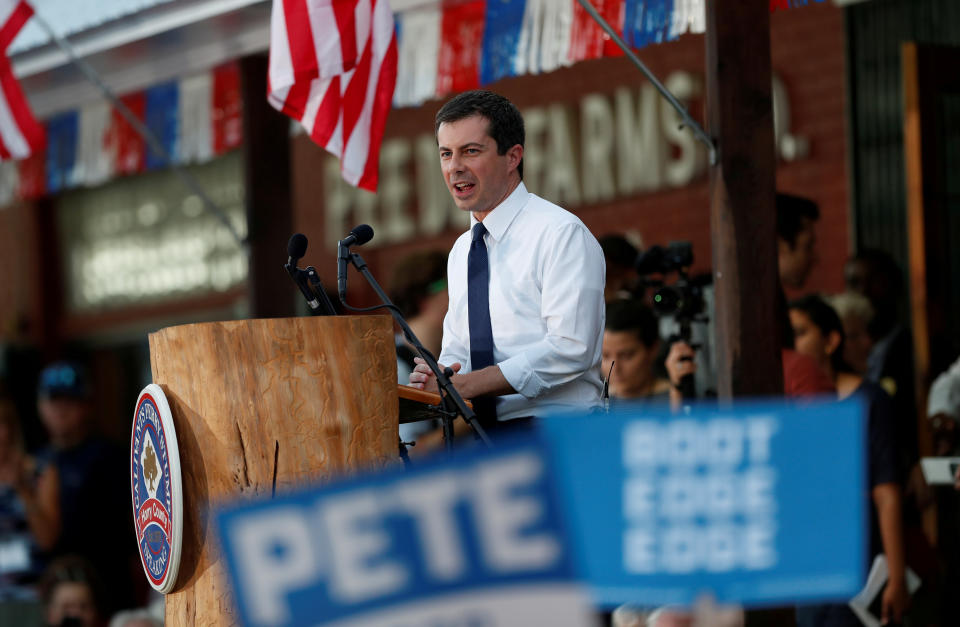Pete Buttigieg's new plan targets social factors in health care
Pete Buttigieg released a health plan on Tuesday that pushes toward universal health coverage by focusing more on the social determinants of health, in an attempt to sharpen the distinctions with other contenders for the Democratic presidential nomination.
The problem, the campaign says in its plan, is that “millions of Americans today still find their health determined by who they are or where they live.” Buttigieg’s proposal would have a budget of $5 billion over 10 years, but offered vague details of how that figure was derived, or how the funding would be distributed.
The South Bend, Indiana mayor’s policy positions have come under intensifying scrutiny as he’s emerged as a front-runner in the early voting caucus in Iowa. And he’s not alone in trying to embrace one of politics’ most polarizing policy issues.

Two of Buttigieg’s fellow front-runners, Senators Bernie Sanders and Elizabeth Warren, discuss issues related to equity in their Medicare for all plans for universal coverage but do not independently address equity. As Sanders likes to say, Medicare for all would mean, “No premiums, no co-pays, no deductibles and no more time wasted arguing with profit-driven insurance companies” for anyone.
Yet in contrast, Buttigieg’s plan focuses on the idea — increasingly supported by independent data — that social factors have a greater effect on health disparities than access to care. Social factors can include things such as food insecurity, homelessness, zip code, financial stability and employment, and mental health.
Buttigieg’s plan is an attempt to help some lower-income Americans who are shut out of the health care system and might not benefit from his previously announced Medicare for All Who Want It plan.
Light details on ‘Equity Zones’
A 2017 paper published by the National Academy of Medicine estimated that social factors comprise between 80% to 90% of health outcomes for patients. Meanwhile, medical care only accounts for 10% to 20% of what keeps a patient healthy, the study found.
Buttigieg’s plan moves to directly address the former. He calls for “Health Equity Zones” to be given extra funding to help address social factors — but the plan is light on how the communities will be defined, or how much funding will be received by each.
“HEZs will establish multi-sector coalitions... (which) could include local housing authorities, food banks, environmental protection organizations, local NAACP chapters, health-care systems, economic development agencies, and safe transportation groups,” according to the proposal.
With all the agencies and community organizations working together, rather than separately as they currently do, it can address the factors that affect a person's health outside of a health care facility.
The idea solves one of the biggest problems in health care today: the existence of silos. A Kaiser Family Foundation study in 2018 published a report that found “significant progress” on health determinants, but that “many challenges remain.”
Kaiser added that “these efforts require working across siloed sectors with separate funding streams, where investments in one sector may accrue savings in another,” the report said.
The Buttigieg plan also places a burden on local communities, saying the federal government “will help communities develop executable plans to address health disparities, with accountability to the community itself.” The plan also requires community to collect a range of data for analysis at the federal level.
Buttigieg spells out other ideas he said will help address bias, including trainings to ensure greater diversity among health care providers and establishing health equity standards for Medicare and Medicaid.
“This plan builds on what we know works,” the candidate said in the plan’s language — which was met with guarded praise by some health advocates.
“This isn’t something that no one has ever talked about before, but I don’t think it’s been a big part of the health care conversation, which has been more focused on finance,” said Katherine Hempstead, senior policy adviser at the Robert Wood Johnson Foundation.
“I don’t think this has been a part of the debate at all, it’s very interesting to have it surface and to see how others will react,” she added.
Craig Garthwaite, director of healthcare at Kellogg School of Management at Northwestern University, said one possible obstacle is that many will be focused on cost of care issues.
“I don’t think the end result is this is going to save money on health care, but it may go some way to making people healthier,” he said.
Most of the conversation around Medicare for all has focused on how it will be funded, and in turn, what services it will cover. Yet, Hempstead argued that the health care debate could benefit from the kind of inter-agency collaboration that dominates the current discussions on climate change.
David Nash, the founding dean emeritus of the Jefferson College of Population Health, said he’s happy to see any candidate promote a national conversation on the importance of social determinants.
A focus on South Carolina
The health plan comes as the Buttigieg campaign has focused on South Carolina, the fourth state on the primary calendar, this week. The mayor has recently jumped to the top of the field in Iowa and New Hampshire, but he has not shown a similar jump in South Carolina where the largely African-American primary voters have indicated a strong preference for former Vice President Joe Biden as well as Warren and Sanders so far.

Buttigieg’s plan shares similarities with some other candidates, such as Sen. Kamala Harris, who focuses on minorities and health disparities, as well as women’s health care. Harris has embraced policies that address black maternal mortality and clean drinking water in low-income communities.
In Buttigieg’s proposal, South Carolina’s sizable black population — an area where Buttigieg has lacked support — is given a mention. “In South Carolina, black families — who are almost three times more likely to be poor than white families — may struggle to stay healthy if nutritious food is inaccessible to them,” the plan says.
Buttigieg also recently announced a statewide ad campaign in South Carolina that is says is “is part of a $2 million media investment in the Palmetto State.”
He will discuss the plan further in South Carolina during a stop Tuesday in the town of Okatie, which the campaign notes is home to a fast-growing Latino population. The campaign emphasizes that the plan would benefits Americans across the country.
“We can empower more health departments to become leaders in their communities to address inequity, multi-sector partnerships build healthier communities,” the plan’s language reads.
“Health systems reach beyond the four walls of clinics to address the social determinants of health. We just haven't made the investments to bring these to scale,” it added.
Read more:
Pete Buttigieg has a big new plan to shake up the retirement system
How Pete Buttigieg mimics Elizabeth Warren
Pete Buttegieg's plan to avoid student loan debt threatens this company
Pete Buttigieg's prescription drug plan eyes funding for opioid treatment

